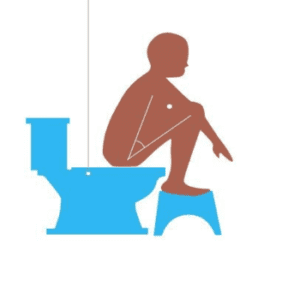Constipation and its Effect on Function
Having bowel movements is an important activity that most people do every day without giving it much thought or attention. However, sometimes we must pay extra attention to our children’s bowel movements to ensure that the bowels are functioning as they should. When kids stop going #2 regularly, it can negatively impact their physical and emotional health. It is crucial that parents identify when their child is experiencing constipation so that they can intervene in an effective and timely manner.
Is my child constipated?
Occasional constipation is normal and happens to everyone from time to time. It can be caused by travel, change in diet, illness, dehydration or medication side effects. Occasional constipation is marked by less frequent bowel movements, straining when pushing, and bowel movements that are solid, large, dark, and have cracks.
Most often, occasional constipation is resolved through lifestyle changes. With the following natural remedies, constipation should resolve within 1-2 weeks:
- Increase fiber intake
- Increase physical activity
- Limit dairy intake
- Proper seating on toilet
- Sit on potty after eating
If the frequency, ease of pushing, and appearance of your child’s bowel movements does not return to normal within two weeks, it is crucial to explore additional interventions so that the constipation does not become more severe. If not treated, occasional constipation can lead to functional constipation, which is more serious and requires intervention.
What is functional constipation?
When kids have painful bowel movements, they avoid going potty which is more commonly referred to as “withholding bowel movements.” When kids withhold, the stool becomes more dry, more solid, and larger. This makes it even harder and more painful to push out when attempting to void. Therefore, the child continues to avoid going potty. Eventually, the intestines will stretch and the child will be unable to detect that they need to go! This will lead to unconsciously leaking stool or having bowel accidents in their underwear.
Functional constipation is marked by:
- Abdominal protrusion
- Stomach aches, vomiting, nausea
- Poor appetite, feeling of full
- Bedwetting or daytime dripping
- Mood changes
- Hiding underwear and denying accidents
- Two or fewer bowel movements per week
What are the effects of constipation on my child’s functioning?
Constipation can impact mood and a child’s ability to manage emotions. It may contribute to bladder accidents and bedwetting frequency. It can also lead to smears of fecal matter in underwear. Frequently, constipation can lead to a decreased appetite and overall poor self esteem. Left untreated, it can lead to impaction in the intestines.
What can I do to resolve my child’s constipation?
Consult your child’s pediatrician, occupational or physical therapist for more information about specific interventions to resolve constipation. They may recommend a combination of the following strategies:
- Take data on the frequency, size, and texture of child’s stools to present to medical and therapy team
- Oral laxatives like MiraLax and Mineral Oils
- Stimulant laxatives like ExLax
- Rectal laxatives like Enema and Suppository
- Lower Abdominal Massage
- Biofeedback
- Diaphragm Strengthening
- Behavior strategies such as reinforcement systems
- Proper ergonomic setup of toilet
Quick toileting tips:
- Set up the space:
Position feet on a stool –> This helps a child feel secure on the toilet.
Lean forward slightly at the hips –> This sets the child up in the ideal position for pushing.
2. Eliminate urinate first before attempting to have bowel movement.
3. Implement a schedule in which child sits on toilet after eating, when the body is most ready to eliminate.
If your child is having difficulty with constipation, the team of therapists at Chicago Pediatric Therapy and Wellness Center are here to support you and your child in resolving your child’s toileting challenges.



